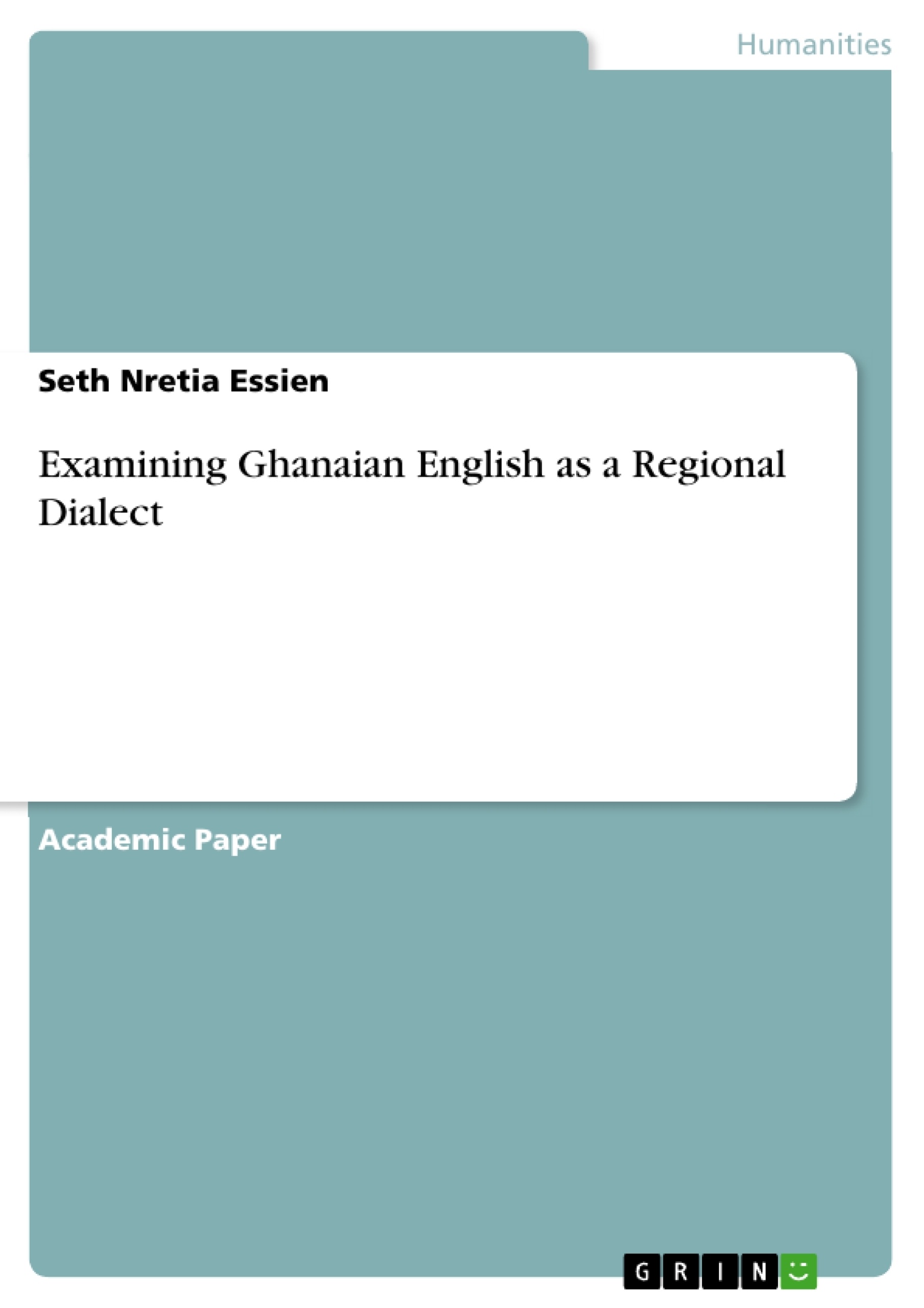This paper aims to answer the following questions: What is the nature of Ghanaian English as a regional dialect? And how is Ghanaian English different from British English?
"The Dynamic Model of the evolution of New Englishes" by Schnelder categorises Ghanaian English within the Outer Circle variety spoken in Britain’s former Gold Coast colony in West Africa. It concludes the debate of whether there is what is called Ghanaian English at all, citing other varieties in different part of the world as a backing. This work examines the extent to which Ghanaian English is truly Ghanaian, its uniqueness that characterizes it as a variety of English in terms of pronunciation, register and syntax.
Statement of the Problem. Scholars and educated elites who have passed through the English medium education sometimes argue over the type of English spoken in Ghana as ungrammatical. Because of that it is not easy to condemn or criticize Ghanaian English as bad or wrong since it has moved far away from the colonial English that gave birth to it. Others even think it should not be considered English.
The main aim of this study is to examine the extend of growth and deviation of GhE away from its origin in terms of register, semantics, phonetics among others. It also aims at finding out if in the midst of this variation, it could be considered English at all. In other words, it identifies the concept and characteristic of language variety, in this case, variety of English.
Inhaltsverzeichnis (Table of Contents)
- Introduction
- Statement of the Problem
- Research Questions
- Purpose of study
- English in Ghana
- Characteristics of Ghanaian English
- Some examples of Ghanaian English
Zielsetzung und Themenschwerpunkte (Objectives and Key Themes)
This study aims to examine the development and divergence of Ghanaian English (GhE) from its British origins, particularly in terms of register, semantics, and phonetics. It explores the extent to which GhE can still be considered a variety of English, analyzing its unique characteristics and evolution as a regional dialect.
- The nature of Ghanaian English as a regional dialect
- The differences between Ghanaian English and British English
- The impact of colonization and linguistic convergence on the development of Ghanaian English
- The influence of native languages and social groups on English usage in Ghana
- The reinterpretation and restructuring of English language subsystems in Ghana
Zusammenfassung der Kapitel (Chapter Summaries)
- Introduction: This chapter introduces the study's focus on Ghanaian English as a regional dialect, situating it within the framework of Schneider's (2003, 2007) Dynamic Model of New Englishes. It explores the debate surrounding the existence and characteristics of Ghanaian English.
- Statement of the Problem: This chapter highlights the controversy surrounding the use and perception of Ghanaian English, particularly by scholars and educated elites who often criticize it as ungrammatical or deviant from standard English. The chapter discusses the complexities of evaluating GhE and its evolving nature.
- Research Questions: This chapter outlines the key research questions driving the study, which aim to investigate the nature of Ghanaian English as a regional dialect and its distinctions from British English.
- Purpose of study: This chapter clarifies the objectives of the study, which aim to examine the extent of GhE's growth and divergence from its British origins, particularly in terms of register, semantics, phonetics, and other linguistic aspects. It also explores the question of whether GhE can still be considered English in the context of its variations.
- English in Ghana: This chapter traces the history of English in Ghana, starting with the arrival of English merchants in the 17th century and the formal colonization of the Gold Coast in the 19th century. It explores the evolution of English usage among different social groups in Ghana, highlighting the influence of colonization and subsequent independence on linguistic practices.
- Characteristics of Ghanaian English: This chapter examines the unique features of Ghanaian English, drawing upon Schneider's (2003) model of Nativization and Endonormative Stabilisation Phase. It discusses the reinterpretation and restructuring of English subsystems in Ghana, highlighting specific studies on pronunciation and regional variations in GhE.
- Some examples of Ghanaian English: This chapter presents specific examples of Ghanaian English usage, showcasing the idiosyncrasies of GhE in terms of vocabulary, syntax, and pronunciation. These examples illustrate the unique linguistic features of GhE and its divergence from standard English.
Schlüsselwörter (Keywords)
This study examines the characteristics and development of Ghanaian English as a regional dialect. Key areas of focus include the evolution of New Englishes, linguistic convergence, nativization, regional variation, pronunciation, register, semantics, and syntax. The study explores the impact of colonization, native languages, and social groups on the development and perception of Ghanaian English as a distinct variety of English.
- Quote paper
- Seth Nretia Essien (Author), 2023, Examining Ghanaian English as a Regional Dialect, Munich, GRIN Verlag, https://www.grin.com/document/1361354




